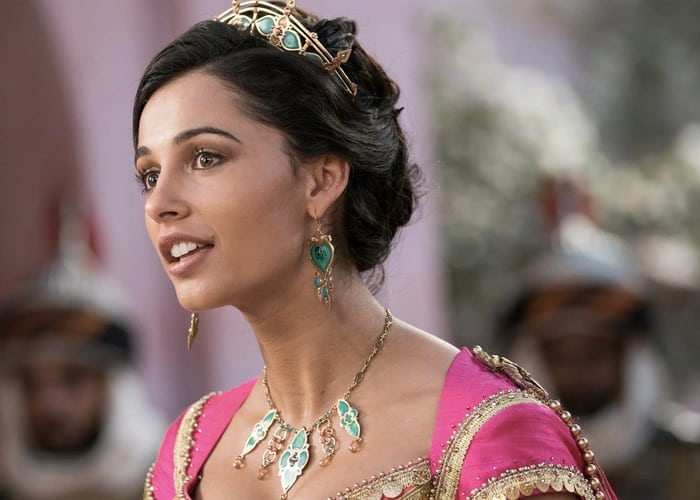Of all the official Disney Princesses, Jasmine is the only one whose movie isn’t her own. She’s not the title character nor is she the main protagonist. Even Princess Aurora is at least the titular role of Sleeping Beauty, even if she spends the majority of that film unconscious. With the live-action reimagining of Aladdin, though, Princess Jasmine is finally elevated near to the status of her branded peers.
The movie is still primarily focused on its eponymous male hero and the magic genie he befriends, but the Jasmine character has more of her own story arc in the remake that’s not just about her wanting to be able to marry a man of her choosing. And as portrayed on screen by Naomi Scott, who was previously the best part of the Power Rangers movie, her narrative is also the most compelling.
Jasmine gets her own solo number to perform in the live-action Aladdin that helps to emphasize her increased significance and empowerment as one of the few major changes from the 1992 animated classic. Contrary to what the trailers for the remake would have you believe, the new Aladdin is not a shot-by-shot re-creation of the animation. And contrary to the usually valid dismissal of new songs added to redos like this as being just Oscar bait, this single original tune, “Speechless,” is an essential part of giving Jasmine her due.
It’s not a perfect supplement. The song, which features music by original Aladdin composer Alan Menken and lyrics by the duo known as Pasek and Paul, doesn’t quite fit in with the rest. It’s not catchy in the same way. It’s not as much of a show tune track as much as a modern pop song, sounding like the kind of covers of in-movie tunes that play over the end credits of Disney movies. It also sounds sort of like a reject from Pasek and Paul’s songbook for The Greatest Showman.
That doesn’t mean I haven’t either been listening to “Speechless” or had the song in my head nonstop since leaving the screening of Aladdin. It’s enjoyable and familiar. And one of the reasons why is that it’s basically Jasmine’s “Let It Go” moment, which was itself basically Elsa’s “Part of Your World” moment and has since also been mimicked with Moana’s “How Far I’ll Go” (the lyrics to “Speechless” even similarly include mentions of waves and storms in addition to the suppression language). While Ariel started the ball 30 years ago in The Little Mermaid, 2013’s Frozen is really credited with beginning this new standard of feminist Disney anthems where the character sings about not being kept in her place.
For Jasmine, it’s not that she’s only being denied the freedom to marry whom she wishes, even if he’s not a certified prince. In this version of the story, she also wants to ascend to the throne of Agrabah, but that’s also against the rules of this fictional Middle Eastern land. As far as I can tell, there has never been a woman sultan who ruled on her own in that region, though there were some further east (where the original Aladdin story may have actually taken place) and also some women had power in the Middle East either as equal ruler to their sultan husbands or are believed to have been the true authority except in official capacity.
This desire is also fitting with the way Disney has gone with their princesses and female protagonists since Frozen. In fact, the branding should eventually just change to Disney Queens since girls would rather be the queen than a princess now anyway. Frozen‘s Elsa becomes a queen without a partner, as does the title character from Moana, though her title is the non-gendered chief, similar to Jasmine’s wanted position as sultan. Ariel also becomes queen in The Little Mermaid II: Return to the Sea, though for her it’s a title achieved by being married to a king, technically Queen Consort.
Even as a forced and increasingly conventional construct for the Aladdin remake, the empowered expansion of the Jasmine character is still a progressive makeover that provides a greater role model for girls in the audience than she does in the original. That’s a smart and profitable step for Disney regardless of whether their motive is partly well-intentioned since girls are the primary draw for Aladdin. It is a Disney Princess movie, after all, even if it’s mostly about a Disney Prince.

